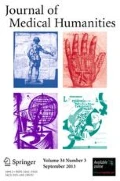Abstract
While even today lesbian, gay, bisexual and transgender people might have cause to distrust the healthcare establishment, how much more fragile was the relationship between sexual minorities and health professionals in the first decade of the AIDS epidemic. Dissent from consensus healthcare and health research then was a question of survival in the face of political and medical intransigence. This article focuses on one version of AIDS dissent: The narrative representations of AIDS in fiction by the gay African-American fantasy writer Samuel R. Delany, which rejected the rigid binarism of “safe” and “unsafe” sex practices, Delany’s evidence-based dissent. He also engaged in a related form of cultural dissent: speaking the unspeakably obscene, at a time when Silence = Death. Delany called into question both the inferential leaps based on limited epidemiological research that were represented in safer sex guidelines and the widespread public reticence about sexual behavior.
Similar content being viewed by others
References
Arendt, Hannah. 1964. Eichmann in Jerusalem: A Report on the Banality of Evil. New York: Viking Press.
Bayer, Ronald. 1981. Homosexuality and American Psychiatry: The Politics of Diagnosis. New York: Basic Books.
Berger, Judson. 2011. “NIH-backed study examined effects of penis size in gay community.” Fox News, July 18. Accessed August 11, 2011. http://www.foxnews.com/politics/2011/07/18/nih-backed-study-examined-effects-penis-size-in-gay-community/.
Boston Women’s Health Book Collective. 1976. Our Bodies, Ourselves: A Book by and for Women. 2nd ed. New York: Simon and Schuster.
Bourdieu, Pierre. 1991. Language and Symbolic Power. Edited by John B. Thompson. Translated by Gino Raymond and Matthew Adamson. Cambridge: Harvard University Press.
Burke, Kenneth. 1945. A Grammar of Motives. New York: Prentice Hall.
Chauncey, George. 1994. Gay New York: Gender, Urban Culture, and the Making of the Gay Male World, 1890–1940. New York: Basic Books.
Coburn, Tom A. 2011. The National Science Foundation: Under the Microscope. United States Senate. Accessed August 23, 2011. http://coburn.senate.gov/public/index.cfm?a=Files.Serve&File_id=2dccf06d-65fe-4087-b58d-b43ff68987fa
Davis, Kathy. 2007. The Making of Our Bodies, Ourselves: How Feminism Travels across Borders. Durham, NC: Duke University Press.
Davis, Ray. 1996. “Delany’s Dirt.” In Ashes of Stars: On the Writing of Samuel R. Delany, edited by James Sallis,162-88. Jackson: University Press of Mississippi.
Delany, Samuel R. 1985, 1989, 1994. “The Tale of Plagues and Carnivals, or: Some Informal Remarks towards the Modular Calculus, Part Five.” In Flight from Nevèrÿon, 181–367. Hanover: Wesleyan University Press.
----. 1993. The Motion of Light in Water: Sex and Science Fiction Writing in the East Village, 1960–1965. New York: Richard Kasak.
-----. 1994. The Mad Man. New York: Masquerade, Richard Kasak.
-----. 1995. “Aversion/perversion/diversion.” In Negotiating Lesbian and Gay Subjects, edited by Monica Dorenkamp and Richard Henke, 7–33. New York: Routledge.
-----. 1999. “The Thomas L. Long interview.” In Shorter Views: Queer Thoughts and the Politics of the Paraliterary, 123–140. Hanover: Wesleyan University Press.
Epstein, Steven. 1996. Impure Science: AIDS, Activism, and the Politics of Knowledge. Berkeley: University of California Press.
Fauci, Anthony. 2009. Statement of Anthony S. Fauci, M.D., Director, National Institute of Allergy and Infectious Diseases, National Institutes of Health, on, National Gay Men's HIV/AIDS Awareness Day September 27. Accessed August 11, 2011. http://www.nih.gov/news/health/sep2009/niaid-25.htm.
Foucault, Michel. 1980. The History of Sexuality, Vol. 1: An Introduction. Translated by Robert Hurley. New York: Vintage.
Fuss, Diana. 1991. “Inside/out.” In Inside/out: Lesbian Theories, Gay Theories, edited by Diana Fuss, 1–10. New York: Routledge.
Habermas, Jürgen. 1975. Legitimation Crisis. Translated by Thomas McCarthy. Boston: Beacon Press.
Herman, Didi. 1997. The Antigay Agenda: Orthodox Vision and the Christian Right. Chicago: University of Chicago Press.
Institute of Medicine (IOM). 2011. The Health of Lesbian, Gay, Bisexual, and Transgender People: Building a Foundation for Better Understanding. Washington, DC: National Academies Press. Accessed August 11, 2011. http://www.iom.edu/Reports/2011/The-Health-of-Lesbian-Gay-Bisexual-and-Transgender-People.aspx.
Jackson, Jr., Earl. 1995. “Imagining it otherwise: Alternative sexualities in the fictions of Samuel R. Delany,” In Strategies of deviance: Studies in gay male representation, 93–125. Bloomington: Indiana University Press.
Jones, James H. 1981. Bad Blood: The Tuskegee Syphilis Experiment. New York: Free Press.
Kalichman, Seth. 2009. Denying AIDS: Conspiracy Theories, Pseudoscience, and Human Tragedy. New York: Copernicus Books.
Long, Thomas L. 2005. AIDS and American Apocalypticism: The Cultural Semiotics of an Epidemic. Albany, NY: State University of New York Press.
Martin, Emily. 1994. Flexible Bodies: The Role of Immunity in American Culture from the days of Polio to the age of AIDS. Boston: Beacon Press.
Newman, John Henry. 1870. An Essay in Aid of a Grammar of Assent. London: Burns, Oates & Co.
Patton, Cindy. 1990. Inventing AIDS. New York: Routledge.
-----. 1996. Fatal Advice: How Safe-sex Education went Wrong. Durham: Duke University Press.
Rowe, Michael. 1994. “Another Obscenity at the Frontier.” The Harvard Gay and Lesbian Review, Fall: 17–18.
Shirer, William L. 1960. The Rise and Fall of the Third Reich. New York: Simon and Schuster.
Sontag, Susan. 1987, 1991. The Way We Live Now. Illustrated by Howard Hodgkin. New York: Noonday Press.
-----. 1988, 1989. AIDS and its Metaphors. New York: Farrar, Straus, Giroux.
Woodhouse, Reed. 1994. “Leaving no Button Unpushed: Review of Samuel R. Delany’s The Mad Man.” The Harvard Gay and Lesbian Review, Fall: 33–35.
Author information
Authors and Affiliations
Corresponding author
Rights and permissions
About this article
Cite this article
Long, T.L. Tales of Plagues and Carnivals: Samuel R. Delany, AIDS, and the Grammar of Dissent. J Med Humanit 34, 213–226 (2013). https://doi.org/10.1007/s10912-013-9209-9
Published:
Issue Date:
DOI: https://doi.org/10.1007/s10912-013-9209-9



